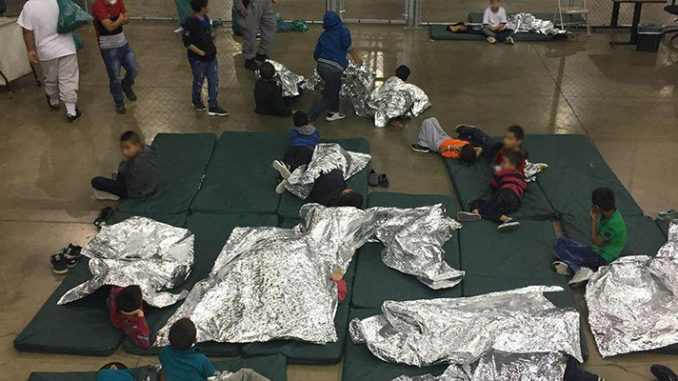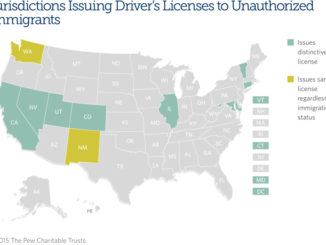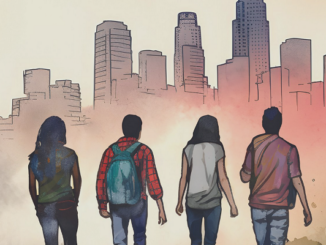
by Coda Rayo-Garza
In June 2015, Donald Trump announced his candidacy for presidency with some of his opening remarks making it clear where he stood on issues of immigration:
The U.S. has become a dumping ground for everybody else’s problems…When Mexico sends its people, they’re not sending their best. They’re not sending you…They’re sending people that have lots of problems, and they’re bringing those problems with us. They’re bringing drugs. They’re bringing crime. They’re rapists. And some, I assume, are good people…It’s coming from more than Mexico. It’s coming from all over South and Latin America, and it’s coming probably — probably — from the Middle East. But we don’t know. Because we have no protection and we have no competence, we don’t know what’s happening. And it’s got to stop and it’s got to stop fast.
He told the American people from day one what he was capable of doing in the mere phrase, “it’s got to stop and it’s got to stop fast.” However, Trump did not formulate a well-thought out, fact-driven immigration policy (or frankly any formal policy) to accompany this claim at that, or any point, in his campaign (and especially not in his presidency). Instead, this mere statement projected a promise to act ignorantly and ideologically driven at all costs — a promise that we have largely seen corporealized as Trump continually makes draconian, inerudite immigration policy decisions.
Trump’s immigration policies have manifested from the promise of a border wall, paid for by Mexico, to keep out “criminals” and “rapists.” They were birthed through the hate he declared the very day he announced his candidacy for presidency. Some of Trump’s other immigration policies — such as the decision to rescind DACA and DAPA, phase out the temporary protected status program for 7 of the 10 countries in the program, and overturn asylum protection statuses — have culminated in a host of harsh and extremist immigration policies unseen in recent American presidencies.
The danger in Trump’s approach to immigration is that it perpetuates fallacies about immigration, and consequently misinforms the American people on issues that go beyond immigration such as public safety, foreign relations, and the American economy.
Take, for example, the decision to modify the H1-B visa program requirements. In April of this year, Donald Trump signed the “Buy American and Hire American” executive order to impose restrictions on employers hiring high-skilled foreign nationals working on an H1-B visa. Just two months prior, U.S. Citizenship and Immigration Services (USCIS) released a memo that claimed to strengthen protections to combat H1-B abuses. Changes included reversing a 2015 rule that made spouses eligible for permits to work in the United States. Tech companies have accused the USCIS of overstepping their role in interpreting the H1-B program requirements. However, Trump claims this initiative will reduce or eliminate outsourcing, consequently bringing jobs back to America. Yet, what is clear from this decision is that it will aim to limit the integration of foreign born persons into America and the American economy: a quixotic dream in times when globalization and international economies are so intricately connected and interdependent. Instead of creating more jobs for Americans, it will encourage tech companies to increase their presence outside the United States.
In May, the Trump Administration announced the termination of the Temporary Protected Status (TPS) humanitarian program that provided temporary cover from deportation for people living in the United States who were unable to return to their home country due to civil unrest, environmental disaster, or other extraneous circumstances. This decision will affect about 57,000 Hondurans, 195,000 El Salvadorians, 50,000 Haitians, 9,000 Nepalese, 1,000 Sudanese, and several other groups. Yemenis in the United States did receive an extensive of their TPS program, although Secretary Nielsen did not approve a redesignation of the program, meaning no additional Yemenis can apply despite the continued humanitarian crisis in the county. Donald Trump’s attempt at mass deportation is not surprising given his praise of similar episodes in U.S. history, such as Operation Wetback. Yet, there is no analytical tool or logical explanation that can justify decisions like the one to end temporary protected status — especially considering that the administration’s reasoning behind ending TPS leans on the false notion that conditions in the TPS countries have improved.
We see this move towards extreme isolationism again in another recent decision by one of Trump’s appointees, leaving the rest of the world to question America’s leadership in democracy as it violates its own rule of law. In June, Attorney General Jeff Sessions overturned existing protections for asylum seekers claiming domestic abuse and gang violence. With this decision, the United States abdicated its global responsibility and stepped away from leading the world as an exemplar of democratic ideals. On the international stage, Trump’s immigration policies, along with other Trumpian touchstone policies, merited global disapproval.
Furthermore, in early July, the Trump Administration admitted to a federal judge that they would not meet the deadline to reunite all children under the age of five with their families, after initial separation at the border as a product of Trump’s “zero-tolerance” policy. Following mounting pressure, Trump issued an executive order to halt family separations, but proceeded to assure his base that families would be confined and detained together, still criminalized. There are children who were separated, early ages and older children, that have yet to be reunited with their families and have already suffered the trauma of being seperated. The damage is done and continues — and even once united, the Trump Administration is doing nothing to treat the trauma that the families have suffered.
Donald Trump’s policies on immigration, driven by ideology, are a barrage on our American values — but our country, not unscathed, will survive this attack. We must not allow these violations of human rights and American values to be normalized or become acceptable in future administrations. We must continue to mount pressure on Trump and his administration to keep them in line with respect to the tenants laid out in our Constitution: that every person is entitled to life, liberty, happiness, and due process of law. Furthermore, every “person” includes those who claim America as their motherland and those who were birthed outside the man-made borders of our country.
Coda Rayo-Garza is a Political Partner with Truman National Security Project. @CodaRGarza



